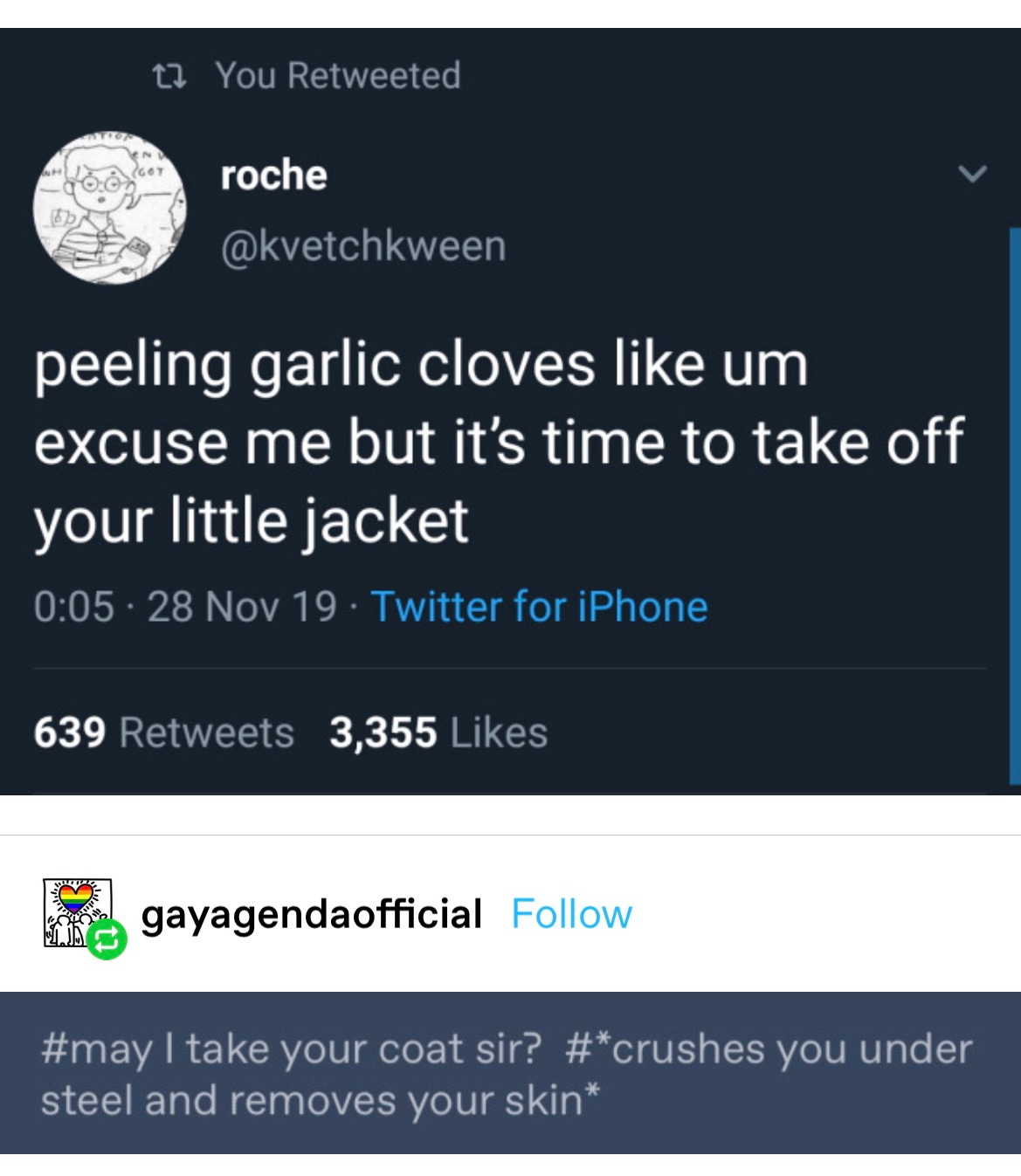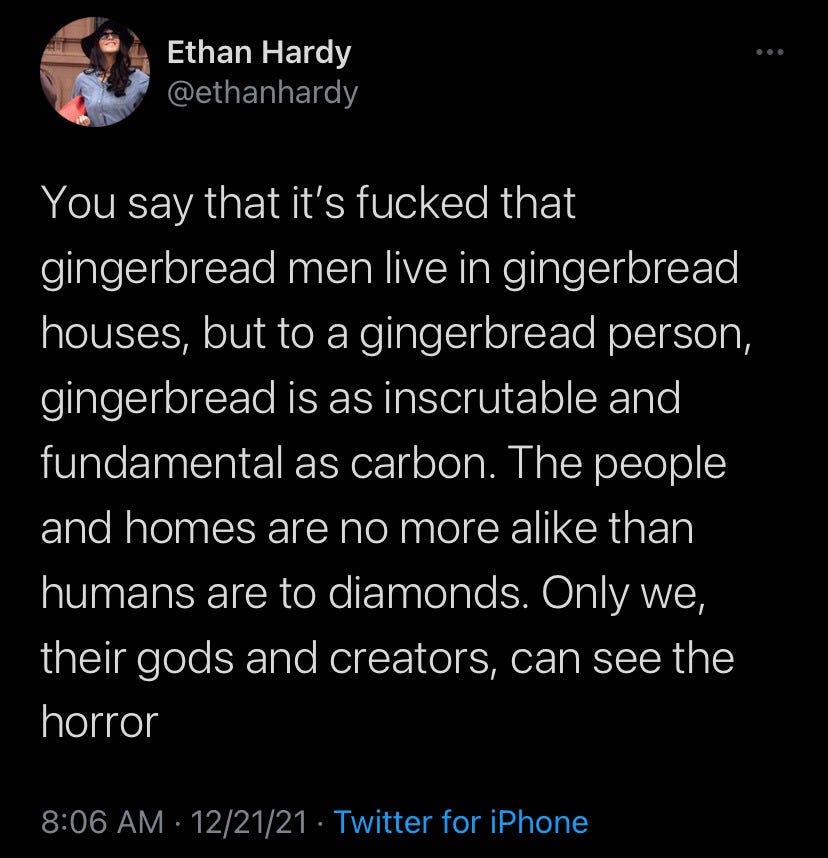To hold on, or to let go
An existential question to start off the year
Welcome, to the very first installation of Way Too Complicated.
In an unexpected twist, today’s issue is not a recipe at all (although it does talk very minimally about cooking), but some thoughts about the idea of holding on, and how it shows up thematically across our lives.
In a hilariously subversive TikTok I watched (and now regrettably cannot find), the female protagonist puts on a fancy suit overlaid with the text “what I’m bringing into the new year with me.” Instinctually, I anticipated the next few seconds to be filled with #toxicpositivity symbols like a leather-bound journal for writing resolutions, bushels of fresh produce for healthy eating, and maybe a cucumber eye mask too—because self-care. But instead, the punch line of the video is that she then gyrates to phrases like “old traumas from my teenage years,” “mental illness I haven’t addressed,” and so forth. (Note: This is paraphrased since I can’t find the video anymore.) For me, it was excellent comedy not just because the climax was unexpected but because it was a timely itch at a particular open scab: this arbitrary concept of “a new year.”
Even though I am well aware that January 1st is just a construct to delineate “then” versus “now,” I can’t help but be enamored with it. It always feels like the time to commit to all sorts of new ideas, to tell myself I am going to wake up and actively choose differently than the days before. Most years, I’m so preoccupied fantasizing how great my future life will be, I forget that for change to be possible, I also have to make room in my heart (and mind) for things to be different. Stated even more plainly, that means letting go of certain things. And that—I’m not so good at.
With 2022 somehow already here, the question I’ve been turning around in my stomach is, “Why should I want to get better at letting go?” Especially when we, as humans, are consistently encouraged to do the opposite: hold on. I mean that in a mostly metaphorical sense (although sometimes we physically need to hold onto things as well, like passports and dog leashes). Although there is a certain messiness, a quiet suffering, to hold onto something, those who hold onto things through precarious situations are rewarded handsomely for their efforts—from long-term stocks to cryptocurrency (lol) and houses (at least, in neighborhoods not being actively de-invested in by the government).
The socially accepted ways we evaluate goodness or success are also linked to our ability to hold on to a medley of discrete-to-abstract concepts—especially if they are in competition with one another. Doing a good job at work is measured by how able we can hold onto a range of shapeshifting tasks, indefinitely: from “remembering to confirm a calendar appointment” to “speaking with deference to senior management, even if I hate their guts.” To be a good parent is to hold onto the anxieties and worries of caring for another being, carrying it from helpless to autonomous, even if this may be in opposition to your own desires or needs. To be a good friend is to hold onto their feelings, to the point you likely even share their sorrows as if they are your own, even when they bear no relevance to your life.
Art, too, is about holding on. About holding onto a feeling for so long, you can translate it into a new form entirely—a sculpture, embroidery, architecture, a plated dish. Maybe that is why art created from sorrow, strife, and pain tends to wow us in particular. Making it requires the artist to hold onto those ugly feelings, even nurture them so that they can be slowly cultivated into masterpieces. Innately, we also know this commitment to holding on poses some danger to the creator of being consumed*—thus, the bigger the risk, the bigger the reward.
*TW: The story of Iris Chang’s suicide is probably the most sobering reminder of this fact for me. Would not recommend reading about it on an empty stomach.
Finding any form of art meaningful requires us to consider, not just consume, our surroundings as it passes us. So then, our work to receive art is also about holding on: to reach out and catch some feeling in this unusual new form. And the more people who grab on, hold on, keeps that feeling from falling into the abyss, which we reflexively fear is to have existed but not remembered. Abstract art, I think, captures this state of tension well. It offers us an expanse to fill with our own ideas and questions, to put our relationships with the world at the forefront. That’s probably why so many hate it—to see such art, and to give it meaning, first requires us to look deeply at ourselves. To hold onto and really see who we are closely enough, we can also pass meaning onto some object we didn’t birth, is a scary amount of reflection for simply passing through a gallery.
Holding on is a sign of strength and of fragility. Perhaps that’s why the stories of women who held onto abusive partnerships illicit both awe and sympathy. It runs counter to how we generally see holding on as advancement: holding onto life by prolonging our days; holding onto youth; holding onto information, knowledge, and ideas by inking them and storing them. In this day and age, the spotty guarantee of the past has now been transcended by our ability to keep data forever. But that doesn’t make holding onto the truth any easier, so even with all the tools we could ever use, we practice selective retention. We use our money and power, and influence to encourage others to engage in the same selective retention as our own: hold onto what we want them to remember, to forget what we refuse to reflect on.
Studies have shown that we curate our memories—or pick which ones we hold onto—so they properly support our sense of self-worth. This could be erasing the times we violated our own moral codes, or twisting scenarios so we can play victim. The underlying purpose is one of ideological self-protection; even as we change and the world around us changes, the relationship we have with ourselves can remain in homeostasis. This, I think, is the same delusion we subscribe to when we accept our decision of holding on as “neutral.” Quite the opposite, holding on is a deliberate game I play each New Year’s: to cling onto what I know from the last year, the last decade, and squeeze my eyes so tightly, I’ll believe things had to be this way.
To be clear, I’m not saying that embracing some version of “let it go” will magically solve mental illness or childhood trauma. (At least, it hasn’t for me yet.) This is not some treatise that we all need to “adjust our attitude” or switch to an “abundance mindset.” Rather, I’m entering this year simply wondering if I can more consciously take stock of what I am even holding on to. Am I truly even aware of what those ideas or concepts are, whether discrete or abstract? In what scenarios can I take a step back to scrutinize these larger, philosophical underpinnings of what otherwise seem to be invisible choices affecting me every day?
As I wrote in the introduction, this newsletter is about the existential question of why we choose to suffer. Since either action of holding on or letting go requires some aspect of discomfort or pain, this conundrum of what to choose eventually leads to the same place: is this what I really want? Where is my choice in this matter?
And to that, the f*ck if I know.
Weekly Meme Roundup
Behold, your first taste of what that made me LOL this week.

Personal Things From This Week
Listening to: Hokage’s Funeral from Naruto OST
Watching: Wind from Luoyang; just finished Matrix: Resurrections (more on that in the next newsletter)
Reading: Iron Widow by Xiran Jay Zhao; just finished Klara and the Sun by Kazuo Ishiguro
Eating: Some salad I harvested from a gifted Gardyn, and a peanut butter goat stew loosely based off this Ghanian recipe from Serious Eats
Drinking: Polished off a magnum of bubbles from Bondle for NYE with my hubby and my sister
Nice thing I did for myself this week: Deliberately did not respond to work emails this weekend, despite having anxiety about not responding.






This was an excellent read. I’m excited to be a subscriber!